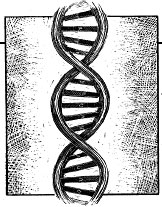FROM THE DEAN
Mapping the future
By John C. Baldwin, M.D.
The spectacularly successful initiative to complete the mapping of the human genome, especially the combined public and private efforts to do so, has been much in the news lately. However, the true import of the study of genetics—from Mendel's pea plants to Watson and Crick's identification in 1953 of the double-helix structure of DNA, to the genome-mapping era, to the meaningful interpretation of this vast quantity of data, to the promise of clinical applications, to the difficult ethical dilemmas posed by that knowledge—is far more complex than the current high-profile coverage of the story.

|
|
Illustration by Suzanne DeJohn The progress we have made in just over a year in creating the new Department of Genetics has been exciting and has more than validated the decision to proceed. |
Explosion: The decision a year ago to create a new department at Dartmouth Medical School, the Department of Genetics, grew out of our recognition that full participation in this explosion of knowledge in the life sciences was essential to Dartmouth's remaining a great academic community in the new millennium.
One of the most gratifying things about this initiative is the way in which it has drawn together diverse elements of the DMS community, including residents of the region, participants in the Dartmouth Community Medical School, graduate students, M.D.-Ph.D. students, medical students, our faculty in both the basic science and clinical departments, our colleagues in the Faculty of Arts and Sciences and the other professional schools at Dartmouth, our alumni, loyal supporters of the institution, and, of course, the administration and Trustees of Dartmouth College. The sense of common purpose and excitement, of a common vision, has been deeply gratifying.
Of course, Dartmouth has a tradition of strength in genetics, scattered across many parts of the Medical School and the Faculty of Arts and Sciences, but this new department has now created a formal, uni- fied scholarly community around this burgeoning field. The new department is one that will substantively involve a broad range of people and organizations from throughout the campus—including the Ethics Institute, the engineering school, the business school, and the Faculty of Arts and Sciences, with particularly strong ties to the Department of Biology. We all recognize that this is a field so transcendent in its importance, so compelling in terms of its many ramifications throughout society, that all these aspects of the university community will have vital roles to play in its development.
Validation: The progress we have made in just over a year in creating this new entity has been exciting and has more than validated the decision to proceed. We have appointed a distinguished chair for the department—Jay Dunlap, a geneticist with international stature in the field—and he is now actively recruiting young faculty and mid-level faculty who will be arriving here in the next year or so.
We are also in the process of renovating the entire sixth floor of our Vail and Remsen research buildings to house the new department and, most important, its research laboratories. To make this possible, we moved all of the DMS administrative offices, including the dean's of- fice and admissions, out of Remsen into newlyrestored space in a historic part of the 1893 Mary Hitchcock Memorial Hospital building; this beautiful old facility evokes the long and distinguished history of our school and its clinical faculty. And student affairs—including a larger and more functional student lounge, with upgraded computer facilities—has now moved into the former administration wing on the third floor of Remsen.
All of this has been made possible by a grant from the Howard Hughes Medical Institute (HHMI) specifically to support the creation of the new department, as well as by the remarkable generosity of friends of DMS who share our excitement about genetics. One year into the effort, we have raised nearly a third of our fund-raising goal. There is much more to be done, but we are confident that the friends of DMS—those who are committed to the School's future—will continue to join in this enterprise.
Commitments: Early on, we determined that the establishment of this new department would require some $32.5 million, with $12.9 million of that sum to come from a combined College-Medical School fundraising campaign—figures that certainly were daunting. Nonetheless, in just over a year, we have received commitments of $7.6 million toward the fund-raising goal, on top of the $3.4-million HHMI grant. The support from the HHMI was especially encouraging; not only was it the sixth-largest of 41 grants that the institute made to medical schools throughout the nation this year, but it was an important vote of affirmation from one of the nation's foremost biomedical research organizations.
I am talking as often as I can to alumni and friends of Dartmouth Medical School—locally, regionally, and nationally—to communicate the excitement and success of this effort, and I am delighted to now share it with the readers of Dartmouth Medicine as well.
The pace of tangible success on all fronts in creating this new department would have been hard to imagine a year ago. I am now con- fident that we can sustain it.
John Baldwin is vice president for health affairs of Dartmouth College and dean of DMS.
Back to Dartmouth Medicine Summer 2000
